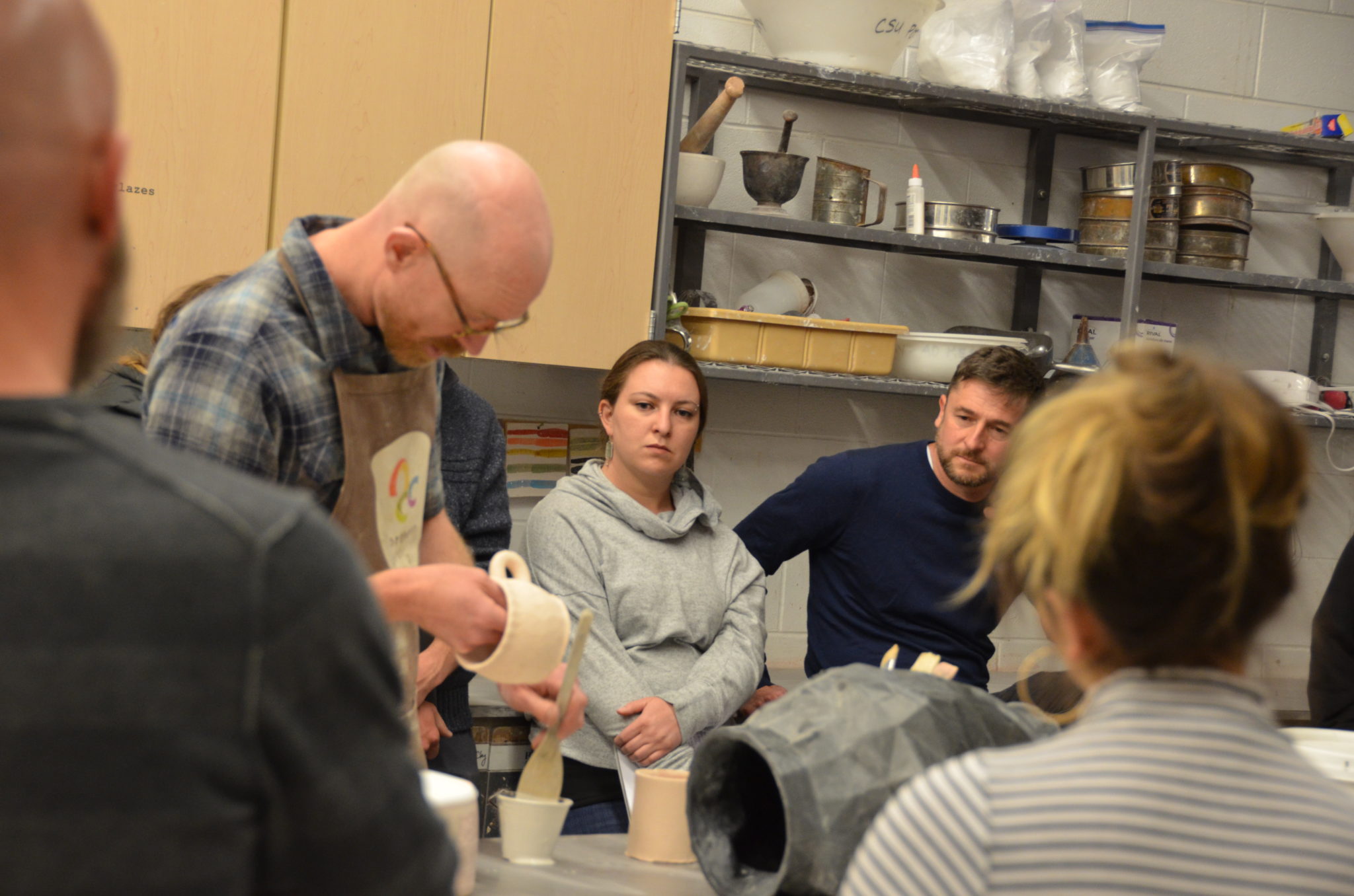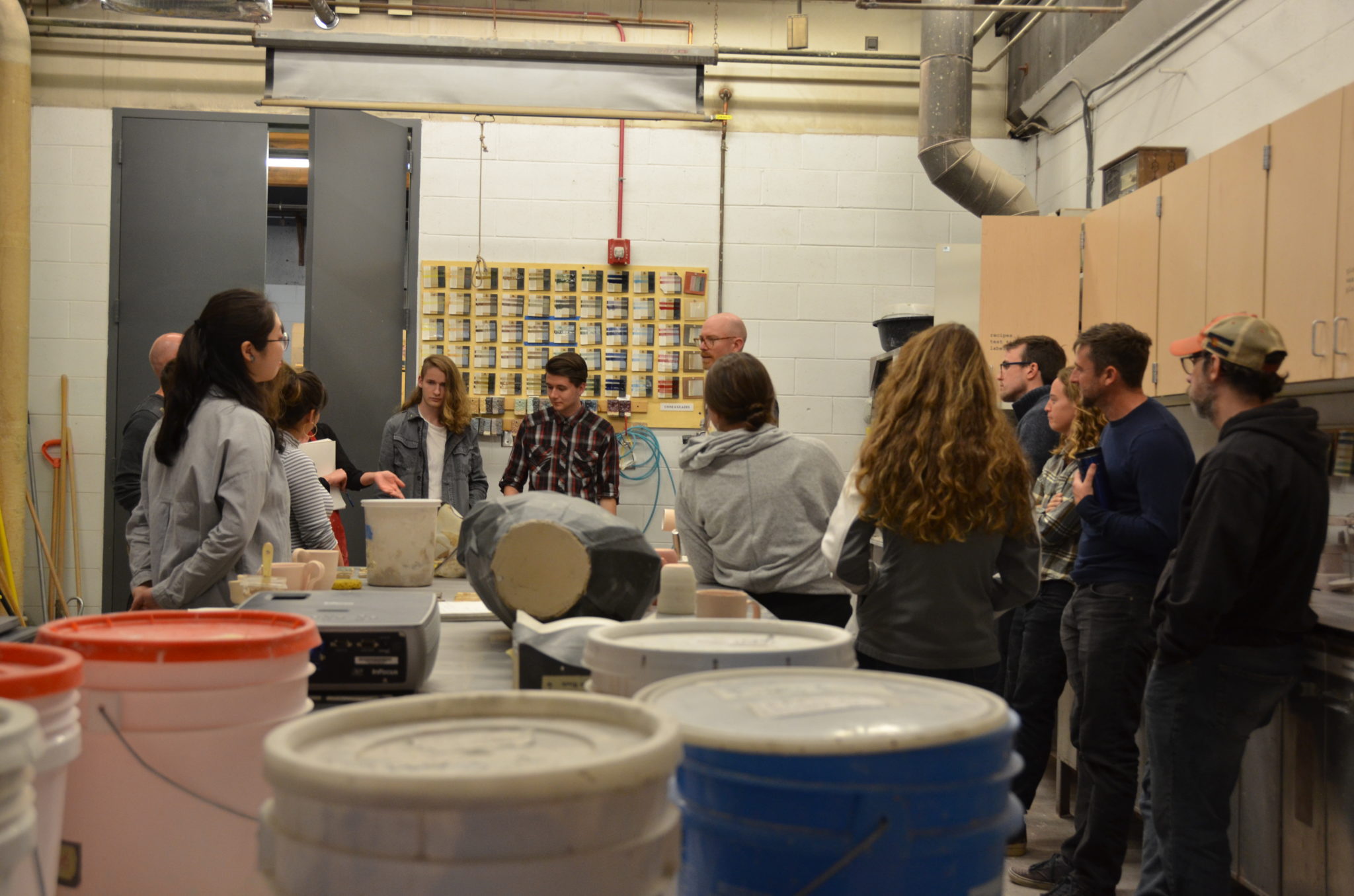
At first glance, you may not see the similarities between writing poetry and creating pottery, but the desire to be engaged in creative work is one of the many things that bring these artistic disciplines together.
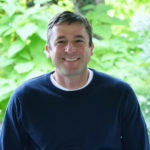
“The Thinking Hand: Phenomenal Explorations in Poetry and Pottery” combines these two disciplines to explore what makes them so uniquely similar. Taught by professor of English Dan Beachy-Quick and associate professor of art and art history Del Harrow, the new team-taught class provided a different kind of thinking process for students to creatively embrace.
“I think our class is trying to find ways to create a space for what Aristotle’s definition of happiness is – the soul being at work creatively,” said Beachy-Quick. “We understood the class was never really about the clay and pottery or the words and poetry, but more the instinct many of us have to want to be at work creatively.”
“So often it’s like our culture has set up working in relation to something external like towards a goal or a grade or graduation. If there is any possibility we could have created a space for students to individually feel that happiness of being at work would be the most rewarding thing,” added Harrow.
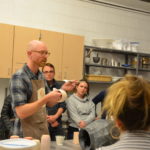
This is the second offering of the course “LB 393: Seminar in Arts, Humanities and the Social Sciences,” an effort from the College of Liberal Arts to inspire interdisciplinary relationships in the liberal arts.
Harrow and Beachy-Quick say this course, at its most fundamental core, sheds light on the parallel between words and clay as the materials for creating art. But more importantly, the way of thinking that is pointed toward a life of being disciplined and open and full of wonder. It is a “beautifully bewildering class,” as the two professors describe it.
Intrinsic structure and method of teaching
Harrow and Beachy-Quick divided the class into three parts: being at work with clay, being at work with poetry, and having genuine discussions about the course reading material – all three intertwined in each class. Students were introduced to exercises that used images and text, maintaining the parallel between the two disciplines in every project.
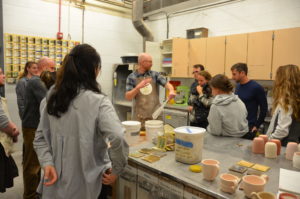 “We wanted to use fundamental techniques with both materials to be asking questions about thinking, and making, and creativity, and imagination,” said Beachy-Quick. “Very strangely, it’s more of a philosophy class of a certain kind.”
“We wanted to use fundamental techniques with both materials to be asking questions about thinking, and making, and creativity, and imagination,” said Beachy-Quick. “Very strangely, it’s more of a philosophy class of a certain kind.”
Since the class is a new experiment for the two professors, the students became collaborators, helping drive the questions and conversations facilitated by Beachy-Quick and Harrow. As a new model of educating and learning, Harrow explained there was a real interest, connection, and longing to invite students into conversations to help discover what the class was truly teaching.
The hope of “The Thinking Hand” is to open students’ mindsets, allowing them to build a practice of being disciplined in life, and ultimately feeling more capable of working honestly and rigorously in whatever medium the students choose. Rather than focusing on the curriculum, the two professors built an experience designed to stay with the students long after the class is finished.
“It’s not knowledge you arrive at, but it’s a way of thinking toward any given thing you want to know,” said Beachy-Quick. “I would love for any of our students to think in five to 15 years and realize something they discovered and experienced in this class is still at play and helping them in ongoing ways.”
Team-teaching benefits
Harrow and Beachy-Quick have been at work planning this class for the better part of a decade. Thanks to the investment by the College in team-taught interdisciplinary courses, they had the opportunity to make their vision a reality.
“The professors are equally learning, and that’s something I think is very worthy that the college opened up an opportunity like that,” said Beachy-Quick.
The two professors note that the structure of teaching and learning is completely different than what can be offered in a solo-taught classroom.
“It’s beautiful in the way that it turns a traditional space of a classroom, which somewhat resembles a square that naturally gravitates the authority to the instructor, and transforms it into kind of a triangle in a way,” said Harrow. “It’s like things can balance and move and the authority is transferred from me to Dan and then to the students.”
Ultimately, the structure allows students to feel empowered and to have an authority in the classroom that is not traditionally offered to them otherwise. Each party involved is put in a unique space that not only allows everyone to learn simultaneously, but also to discover together.
New team-taught seminar offering
“LB 393: Seminar in Arts, Humanities, and Social Science” is an ongoing initiative and will offer team-taught seminars in different subjects each semester. In the fall 2019 semester, the seminar will focus on social movements and forms of collective action happening in our society today.
#blacklivesmatter, #metoo, #DACAmented, #pride: Social Movements & Collective Action through History and Story
Through current events, discussion, film, and young adult literature, students will explore the formation, growth, and currently of social movements and forms of collective action through an in-depth exploration of #blacklivesmatter, #metoo, #DACAmented, and #pride. These social movements offer case studies into contemporary issues of race, gender, immigration, and sexuality. Students will also examine a variety of other movements (such as collective action related to the Dakota Access Pipeline, affirmative action, mental health, and disability) and will have the opportunities to explore a movement of their choosing. We invite students to bring their disciplinary-specific expertise and encourage students from all backgrounds to enroll.
Taught by Ricki Ginsberg, assistant professor of English education, and Jessica Jackson, assistant professor of history.
